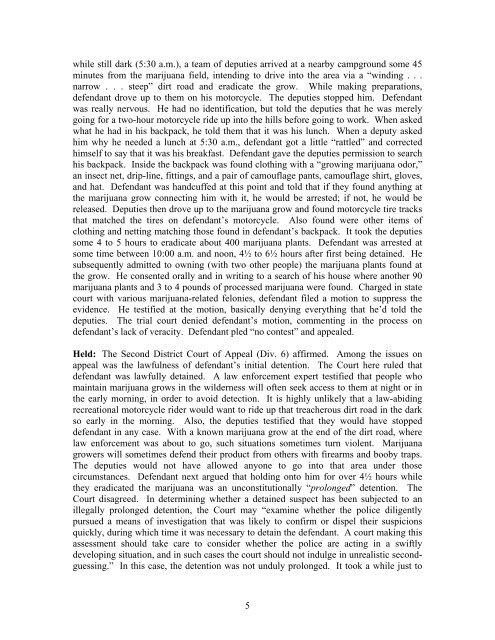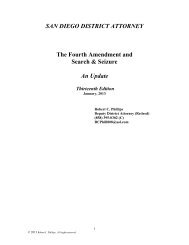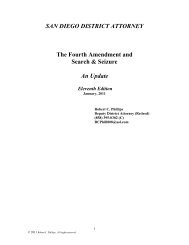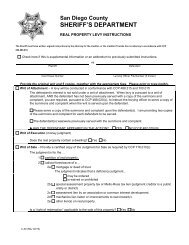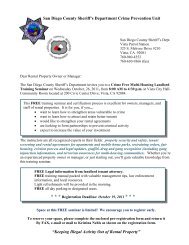San Diego District Attorney - San Diego County Sheriff's Department
San Diego District Attorney - San Diego County Sheriff's Department
San Diego District Attorney - San Diego County Sheriff's Department
Create successful ePaper yourself
Turn your PDF publications into a flip-book with our unique Google optimized e-Paper software.
while still dark (5:30 a.m.), a team of deputies arrived at a nearby campground some 45<br />
minutes from the marijuana field, intending to drive into the area via a “winding . . .<br />
narrow . . . steep” dirt road and eradicate the grow. While making preparations,<br />
defendant drove up to them on his motorcycle. The deputies stopped him. Defendant<br />
was really nervous. He had no identification, but told the deputies that he was merely<br />
going for a two-hour motorcycle ride up into the hills before going to work. When asked<br />
what he had in his backpack, he told them that it was his lunch. When a deputy asked<br />
him why he needed a lunch at 5:30 a.m., defendant got a little “rattled” and corrected<br />
himself to say that it was his breakfast. Defendant gave the deputies permission to search<br />
his backpack. Inside the backpack was found clothing with a “growing marijuana odor,”<br />
an insect net, drip-line, fittings, and a pair of camouflage pants, camouflage shirt, gloves,<br />
and hat. Defendant was handcuffed at this point and told that if they found anything at<br />
the marijuana grow connecting him with it, he would be arrested; if not, he would be<br />
released. Deputies then drove up to the marijuana grow and found motorcycle tire tracks<br />
that matched the tires on defendant’s motorcycle. Also found were other items of<br />
clothing and netting matching those found in defendant’s backpack. It took the deputies<br />
some 4 to 5 hours to eradicate about 400 marijuana plants. Defendant was arrested at<br />
some time between 10:00 a.m. and noon, 4½ to 6½ hours after first being detained. He<br />
subsequently admitted to owning (with two other people) the marijuana plants found at<br />
the grow. He consented orally and in writing to a search of his house where another 90<br />
marijuana plants and 3 to 4 pounds of processed marijuana were found. Charged in state<br />
court with various marijuana-related felonies, defendant filed a motion to suppress the<br />
evidence. He testified at the motion, basically denying everything that he’d told the<br />
deputies. The trial court denied defendant’s motion, commenting in the process on<br />
defendant’s lack of veracity. Defendant pled “no contest” and appealed.<br />
Held: The Second <strong>District</strong> Court of Appeal (Div. 6) affirmed. Among the issues on<br />
appeal was the lawfulness of defendant’s initial detention. The Court here ruled that<br />
defendant was lawfully detained. A law enforcement expert testified that people who<br />
maintain marijuana grows in the wilderness will often seek access to them at night or in<br />
the early morning, in order to avoid detection. It is highly unlikely that a law-abiding<br />
recreational motorcycle rider would want to ride up that treacherous dirt road in the dark<br />
so early in the morning. Also, the deputies testified that they would have stopped<br />
defendant in any case. With a known marijuana grow at the end of the dirt road, where<br />
law enforcement was about to go, such situations sometimes turn violent. Marijuana<br />
growers will sometimes defend their product from others with firearms and booby traps.<br />
The deputies would not have allowed anyone to go into that area under those<br />
circumstances. Defendant next argued that holding onto him for over 4½ hours while<br />
they eradicated the marijuana was an unconstitutionally “prolonged” detention. The<br />
Court disagreed. In determining whether a detained suspect has been subjected to an<br />
illegally prolonged detention, the Court may “examine whether the police diligently<br />
pursued a means of investigation that was likely to confirm or dispel their suspicions<br />
quickly, during which time it was necessary to detain the defendant. A court making this<br />
assessment should take care to consider whether the police are acting in a swiftly<br />
developing situation, and in such cases the court should not indulge in unrealistic secondguessing.”<br />
In this case, the detention was not unduly prolonged. It took a while just to<br />
5


